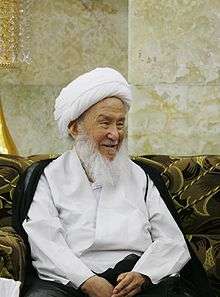Muhammad al-Fayadh
Grand Ayatollah Muhammad Is'haq al-Fayadh (the word al-Fayadh also spelt al-Fayad), (Arabic: محمد إسحاق الفياض, Dari: محمد اسحاق فیاض) is one of the most senior Shi'a marja living in Iraq after Ali al-Sistani.[1][2][3][4]
Muhammad Is'haq al-Fayadh محمد إسحاق الفياض محمد اسحاق فیاض | |
|---|---|
 | |
| Personal | |
| Born | 1930 (age 89–90) |
| Religion | Islam |
| Muslim leader | |
| Website | Official Website |
Biography
Born in Jaghori village in Ghazni province, Afghanistan to Hazara ethnic group, he holds Afghan citizenship. His family were farmers and he started learning the Qur'an from the village cleric when he was five. When he was 10 his family moved to Najaf, where he studied various Islamic studies including Arabic language, rhetoric, logic, Islamic philosophy, the Hadith and Islamic jurisprudence, eventually studying under Grand Ayatollah Abu al-Qasim al-Khoei. When al-Khoei died in 1992 he supported Ali al-Sistani as the chair of the marjaiya in Najaf.[5]
Under Saddam Hussein he adopted a quietist approach, avoiding politics and confrontation with the government.[6]
Following the invasion of Iraq by the United States and allies in 2003, al-Fayyad engaged more than any other marja with the occupying American and British military and diplomats, informing them of the views of the senior clerics. He adopted similar positions to al-Sistani and the other marjaiya: supporting a united Shiite slate for the first Iraqi elections; calling for Islam to be the sole source of Iraqi law;[7] supporting a yes vote in the referendum on the constitution;[8] rejecting a secular Iraq;[9] and opposing the adoption of doctrine of the Guardianship of the Islamic Jurists as adopted by the Islamic Republic of Iran.[5] However, of all the marja'iyya Fayyad is reported to be the biggest opponent of the concept of the Guardianship of the Islamic Jurists.[10] However, this report is contradicted by the official website of the Shi'a Marja, wherein he remarks, "The correct opinion regarding the issue of "Vilayat-e-Faqih" (Guardianship of the Islamic Jurist) is that this issue requires no external proof, because the continuation of Islamic law, and its application, is dependent upon the continuation of the system of Vilayat". He continues, "The vilayat of the Prophet and the immaculate Imams, and in the time of the major occultation of the 12th Imam, the Islamic Jurist is bestowed with this vilayat ... It is unimaginable that Islamic Law could continue to exist without the continuation of this vilayat".[11] Furthermore, he is one of the Ulama signatories of the Amman Message, which gives a broad foundation for defining Muslim orthodoxy.[12]
He has written a number of books on Islamic jurisprudence, Islamic politics, and Islamic banking. A very innovative position of him is written in his book on women's role in society with the title 'Jāyegāh Zan dar Nizām Siyāsīyeh Islām' (English title: 'The position of women in the Islamic political system'). In 2007, press reports indicated that he was supervising the religious studies of the radical cleric Muqtada al-Sadr.[5]
Positions
Socio-political role of women in Islamic societies
Grand Ayatollah al-Fayadh is one of the few Islamic Shia Ayatollahs who are in favor of women in positions of political leadership. In June 2018 an article was written on a Persian website,[13] which was later translated in English.[14] There the Islamic position of Ayatollah al-Fayadh concerning the position of women in Islamic society was discussed, citing his book 'Jāyegāh Zan dar Nizām Siyāsīyeh Islām' (English title: 'The position of women in the Islamic political system') on that subject. "In response to a number of jurisprudential questions in relation to the role of women in society, he declared it permissible for women to take any of the three following positions: political leader, judge and religious jurisconsult." [14]
The article continues to explain al-Fayadh' opinion concerning women and the different positions they can take in society: "It is irrespective of whether this is a social position like politics or an individual one like being a driver, a pilot etc. With this reasoning he believes that in all spheres of life, be it social, individual, ideological, freedom of expression, business, financial trading, land cultivation etc. women and men are completely equal." [14]
References
- List of Maraji in Arabic Archived 2 November 2012 at the Wayback Machine
- Official website
- Mehdi Khalaji (2005). "Religious Authority in Iraq and the Election". PolicyWatch. The Washington Institute for Near East Policy. Retrieved 25 June 2007.
- Kamran Bokhari (2006). "The Shiite Schism". Geopolitical Intelligence Report. Stratfor, reprinted on Wadinet.de. Retrieved 25 June 2007.
- Grand Ayatullah Muhammad Ishaq Fayyad Archived 16 October 2010 at the Wayback Machine, Encyclopedia of Modern Middle East Wars (republished), 27 January 2009
- Farrukh Saleem (2004). "Is Iraq Bush's Vietnam?". The Friday Times, reprinted at Worldpress.org. Retrieved 25 June 2007.
- IslamOnline.net & News Agencies (2005). "Iraq Shiites Insist Islam Be Sole Source of Legislation". IslamOnline.net. Retrieved 25 June 2007.
- Le principal parti chiite appelle à voter «oui» à la Constitution, (French) Maghress, 2005-09-24, accessed on 2010-06-17
- Steven Komarow (6 February 2005). "Leading Shiite cleric says new Iraq must embrace Islamic law". USA Today. Retrieved 25 June 2007.
- BEYOND THE BATTLE, THE QUIET STRUGGLE FOR IRAQ'S FUTURE Archived 13 October 2007 at the Wayback Machine, Financial Times Magazine, 2004-08-15, accessed on 2010-06-17
- THE OFFICIAL WEBSITE OF SHEIKH ISHAQ AL-FAYYAD, IN ANSWER TO QUESTIONS REGARDING THE ISSUE OF "THE GUARDIANSHIP OF THE JURIST"
- Al-Fayyad's official reply to Amman Message
- Syed Hādi Tabatabā’ī (2018). "گامی به پیش در فقه بانوان". mobahesat.ir. Retrieved 20 June 2018.
- Sadiq Meghjee (2018). "Ayatollah Ishaq Fayyadh and the Role of Women in Society". iqraonline.net. Retrieved 24 June 2018.